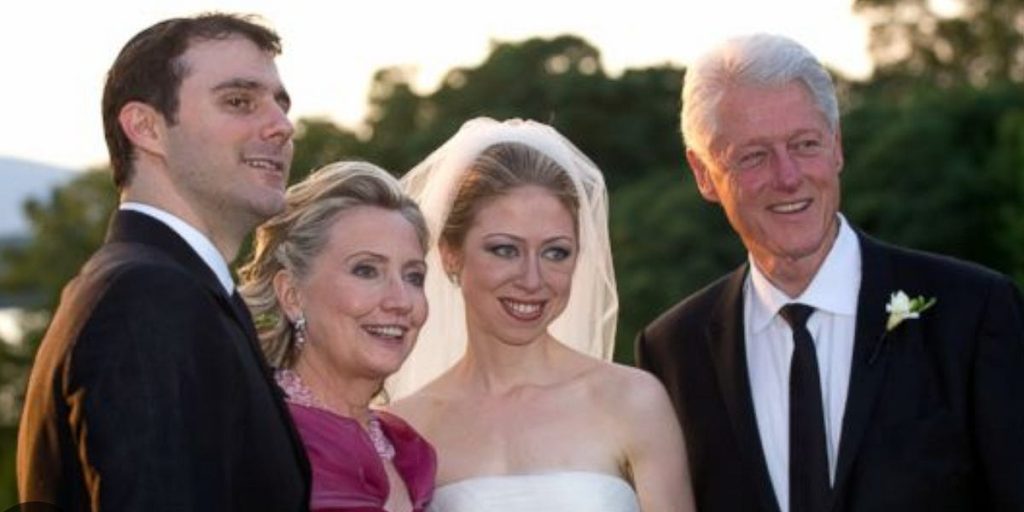Clinton Family Corruption: Son-in-Law Marc Mezvinsky’s Troubled Business Ventures and Controversial Connections

Originally Published on the Author’s Substack

Marc Mezvinsky, the son-in-law of former President Bill Clinton and Secretary of State Hillary Clinton, has faced significant scrutiny due to his string of business failures and controversial connections. With a background that includes working at Goldman Sachs and his marriage into a prominent political family, Mezvinsky’s financial missteps and alleged preferential treatment have raised questions about his business acumen and the ethics surrounding his ventures.
Early Life and Goldman Sachs:
Born on December 15, 1977, Marc Mezvinsky comes from a politically connected family. His father, Edward Mezvinsky, served as a Democratic congressman, and his mother, Marjorie Margolies, was a member of the U.S. House of Representatives. Mezvinsky’s first job in the financial sector was at Goldman Sachs, a renowned investment bank, where he gained valuable experience and established influential connections.
A Track Record of Failures:
Despite his privileged background and association with Goldman Sachs, Marc Mezvinsky’s business ventures have been marked by consistent failures. One notable example is his hedge fund, Eaglevale Partners, which suffered significant losses and ultimately shut down in 2016. Mezvinsky’s inability to generate successful investments has raised doubts about his capabilities and led to allegations of receiving preferential treatment due to his family ties.
Controversial Bailouts and Insider Connections:
One particular point of contention surrounding Marc Mezvinsky is the alleged bailouts provided to him by the Clinton family. Reports indicate that Mezvinsky’s failing enterprises received financial assistance, leading to accusations of favoritism and the potential misuse of political influence. Of particular concern is the revelation of shared classified information related to Greek bailout plans, involving his mother-in-law, then-Secretary of State Hillary Clinton, and family friend Sidney Blumenthal. The use of such sensitive information for personal gain or the benefit of others raises serious ethical questions.
The Greek Investment:
In 2012, Marc Mezvinsky established a $325 million basket of offshore funds under the Eaglevale Partners banner, driven by his belief in the potential recovery of the Greek economy. Mezvinsky’s strategy hinged on the assumption that the Greek banking system’s bailouts would enhance the value of the country’s distressed bonds. He created a fund exclusively dedicated to Greek debt, aiming to capitalize on the perceived opportunities emerging from the crisis.
Insider Information Allegations:
During the period when Mezvinsky made his Greek investment, his mother-in-law, Hillary Clinton, served as the Secretary of State. Later released emails from 2012 reveal that Clinton and Clinton Foundation consultant Sidney Blumenthal exchanged classified information about the German leadership’s perspective on a Greek bailout. These emails coincided with Mezvinsky’s decision to direct his hedge fund’s focus towards Greece.
Critics argue that the sharing of such sensitive information with family members could constitute a breach of federal regulations that prohibit the use of nonpublic information to further personal or private interests. Even the perception of a conflict of interest raises concerns about fair play and equal opportunity within the investment landscape.
*Editorial Note: The author could not locate any record of an investigation by the SEC or FBI regarding this case.
Mezvinsky’s Relationship with Goldman Sachs:
Adding another layer of complexity to the allegations, Mezvinsky’s previous employment at Goldman Sachs, a renowned investment bank, has drawn attention. Eaglevale Partners had a special arrangement with Goldman Sachs, with the bank serving as the hedge fund’s prime broker and banker. Some critics argue that Mezvinsky’s association with the bank may have facilitated access to privileged information or preferential treatment.
The Intersection of Personal and Political Interests:
The involvement of high-ranking officials, such as Gary Gensler, the head of the United States Commodity Futures Trading Commission, further raises eyebrows. Gensler, who had previously worked as co-head of finance at Goldman Sachs, emailed Clinton about the potential impact of a bailout by the European Central Bank on Greek bonds. The intertwining of personal and political interests in this manner only amplifies the concerns surrounding potential insider information.
The Collapse of Eaglevale Partners:
Unfortunately, Mezvinsky’s Greek investment did not yield the desired results. As the Greek debt crisis persisted, Eaglevale Partners faced significant losses, with one fund dedicated to Greek debt suffering near-total losses. The speculative bets on Greece’s financial recovery did not materialize as anticipated, leading to substantial financial setbacks for the fund and its investors.
Several factors played a role in the collapse of Eaglevale Partners and the ultimate failure of Marc Mezvinsky’s Greek investment. First and foremost, the highly volatile and unpredictable nature of the Greek financial landscape presented inherent risks. The country’s ongoing economic crisis, coupled with the complexities of European politics and monetary policy, created an environment prone to sudden shifts and challenges.
Additionally, Mezvinsky’s lack of expertise and experience in navigating politically volatile situations as a “global macro” investor may have contributed to his misjudgment. Although his previous employment at Goldman Sachs provided a foundation in finance, it did not necessarily equip him with the specialized knowledge required to succeed in such high-stakes investments.
The collapse of Eaglevale Partners resulted in substantial losses for the fund’s investors, including high-profile institutions like California’s public employee pension fund, CalPERS. The financial repercussions underscored the importance of conducting thorough due diligence and diversifying investments to mitigate risk.
Transparency and the Fair Market:
While no concrete evidence has been presented to substantiate the allegations of insider information, the perception of impropriety remains. The case highlights the importance of transparency, fairness, and equal access to information within the financial markets. Upholding the integrity of market practices is essential to foster investor confidence and ensure a level playing field for all participants.
The intertwining of personal and political interests in Marc Mezvinsky’s business ventures raises concerns about conflicts of interest and ethical impropriety. While monitoring international economic situations was within Secretary Clinton’s purview, the potential connection between her actions and Mezvinsky’s investments is troubling. The perception of insider information being shared or special favors being granted undermines public trust and raises questions about the fair and equal treatment of all investors.
Life After Eaglevale:
Marc found his way to Social Capital, a Palo Alto based VC (Venture Capital) firm, not long after shuttering his hedge fund. Social Capital focused mostly on tech startups and Mezvinsky took on the cushy gig of Vice Chairman. This position lasted for about a year (2017 – 2018). The reason for his departure is unknown. Finally, in 2019, Marc is tucked away at TPG (Texas Pacific Group)as a managing director, where he remains as of the time of this article. TPG is a private equity firm with holdings all over the world. He also sits on the boards of several nonprofits. Critics have claimed that after the controversy of the Greek debacle, Marc was “handled” by the Clinton’s Political Fixers and kept away from the limelight.
Lack of Accountability and Public Perception:
One of the prevailing criticisms surrounding Marc Mezvinsky’s business failures is the perceived lack of accountability and consequences. Despite his repeated missteps, Mezvinsky has seemingly escaped the full brunt of financial losses, leading to allegations of a double standard and the protection of his interests due to his family connections. Such perceptions erode public trust in the fairness of the business landscape and contribute to the skepticism surrounding politicians’ financial dealings.
Conclusion:
Marc Mezvinsky’s business failures, coupled with the controversies surrounding his connections and alleged bailouts, have cast a shadow on his professional reputation. The ethical implications of his ventures and the potential misuse of insider information raise serious concerns about fairness and transparency in the business world. It is crucial for individuals in positions of influence and power to be held accountable for their actions, and for public trust to be restored through transparent and impartial dealings.
One of our country’s most important freedoms is that of free speech.
Agree with this essay? Disagree? Join the debate by writing to DailyClout HERE.





Not a member of the tribe. at. all.
Excellent article..
I’m curious, ‘though, why no mention of his father’s (Edward Mezvinsky) five-year federal conviction for bank, mail, and wire fraud?
The apple didn’t fall far from the tree, and this is the synergy of wedding two criminal families into one gigantic, Democrat Crime Syndicate.
DON’T FORGET DADDY WENT TO THE BIG HOUSE FOR HIS BUSINESS DEALS
Oh I’m just sure the son in law and Hillary had several successful business deals before his business went south and the little boy lost put. Yes she added that corrupt vile influence and he never had a chance not to mention. Ole Sorous and his corrupt input…this boy never had a chance with this kind of evil on both sides and then to dealing with Chelsea’s child buying selling adrenalchrome evil ass self, that it it’s self is enough to drive a person crazy. And I’m sure they had business with the biden imposter to using a d stealing children for that adrenalchrome they sell to the elites to keep them youthful…ugh these people are kicking the doors of hell in, they can’t get there quick enough!
The key to knowing if criminal insider trading happened is in the timing of the first Greek (any) investments vs. timing of the insider emails or texts. And those should have been well before news made it public, such as Germany’s bailout of Greece. Did that happen?